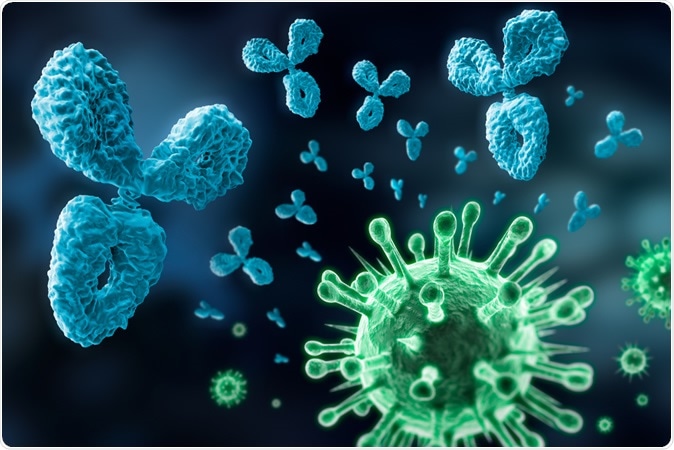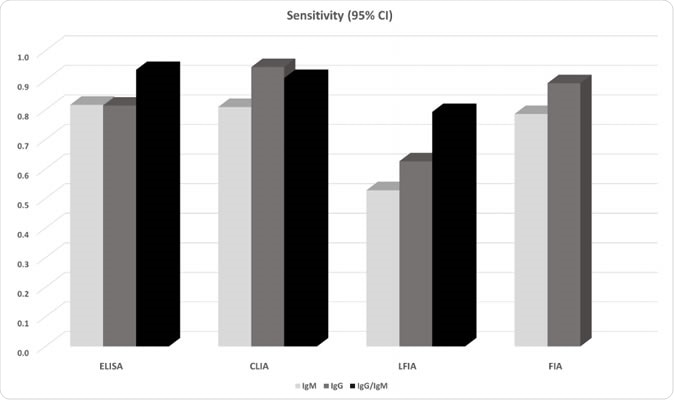Testing for those who have developed antibodies against the coronavirus can help tackle the ongoing COVID-19 pandemic. Now, a new study has identified all the antibody tests available for the coronavirus disease (COVID-19) to determine which performs better and is more accurate.
While the world is starting to reopen businesses and ease restrictions, health experts believe that antibody testing can help de-escalate public health measures while maintaining epidemiological vigilance. Identifying people with severe acute respiratory syndrome coronavirus 2 (SARS-CoV-2) immunity and estimating their proportion in the entire population, may guide governments in planning for a return to normalcy.
What is antibody testing?
Also called a serological test, an antibody test is designed to detect antibodies produced in response to a virus. The test relies on testing the blood to check for past infection.
Antibodies are proteins that help fight off infections. These are specialized protein molecules that the immune system produces in response to foreign invaders, called antigens.
B-cells, also known as B lymphocytes, produce antibodies, which are Y-shaped structures that bind with a matching site on antigens. They neutralize and kill the antigens to prevent infection. When a person develops antibodies against a specific virus, the body will have the ability to ward it off if he or she gets exposed again.

Antibody and virus - visual concept of the immune system. Illustration Credit: Peter Schreiber / Shutterstock
Antibody testing amid the coronavirus pandemic will help identify immune people, including healthcare workers who can go back to work without risking their health or that of others. It can also guide health officials in deciding when to reopen borders and monitoring the development of herd immunity.
Serological tests
The coronavirus health crisis, which emerged in late December 2019, has spread across the world, infecting over 5 million people. Antibody testing is a valuable tool to combat COVID-19.
The researchers at the University of Thessaly in Greece and the University of Cyprus aimed to summarize the available evidence on all the antibody-tests for SARS-CoV-2.
In a study, published in the journal Diagnostics, the researchers conducted a systematic review and meta-analysis of studies about antibody testing in online sources such as PubMed, medRxiv, and bioRxiv. The team evaluated IgM and IgG tests based on various serological tests, including the Enzyme-linked immunosorbent assay (ELISA), Chemiluminescence Enzyme Immunoassays (CLIA), Fluorescence Immunoassays (FIA), and the Lateral Flow Immunoassays (LFIA).

Pooled sensitivity of antibody tests obtained from meta-analysis.
The researchers identified 38 studies that contain data from nearly 8,000 participants. The team found that tests using the S antigen are more sensitive than N antigen-based tests. Further, they noted that IgG tests had better results compared to IgM tests, showing better sensitivity when the samples were taken long after the onset of the symptoms.
The team also revealed that combining the IgG and IgM tests is a better method in terms of sensitivity. However, all the test methods had a high specificity. Two tests, the ELISA and LFIA, reached specificity levels of 99 percent.
"ELISA tests could be a safer choice at this stage of the pandemic. LFIA tests are more attractive for large seroprevalence studies but show lower sensitivity, and this should be taken into account when designing and performing seroprevalence studies," the researchers wrote in the paper.
Return to normalcy
When accurate and useful antibody tests become widely available, the results will show how many people had COVID-19 and have recovered, including those who are asymptomatic. Testing may identify who might have immunity and can help in contact tracing to assess who else is at risk of infection. Further, it will help determine how far the virus has spread, guiding interventions in case the virus resurfaces in the future.
All the data gathered through antibody testing will help improve strategies to curb the coronavirus pandemic and help nations to return to normal.
The non-pharmacological interventions for COVID-19 include social distancing measures, increasing testing rates, contact tracing, ban of mass gatherings, movement restrictions, and school closures. Though these are effective, they could have tremendous societal and economic consequences.
Antibody testing can help reduce the negative impacts of the pandemic since it can determine who is immune to the virus, who can return to work, and if herd immunity has been attained.
The World Health Organization (WHO), however, emphasizes that there is still no evidence that people who were infected with the novel coronavirus are immune.
Many countries today are testing for SARS-CoV-2 antibodies. Though the WHO supports these studies to understand the extent of the outbreak, it does not recommend it to be used as a form of immunity passport, which can enable people to travel or return to work, assuming that they are protected against re-infection.
Sources:
Journal reference: